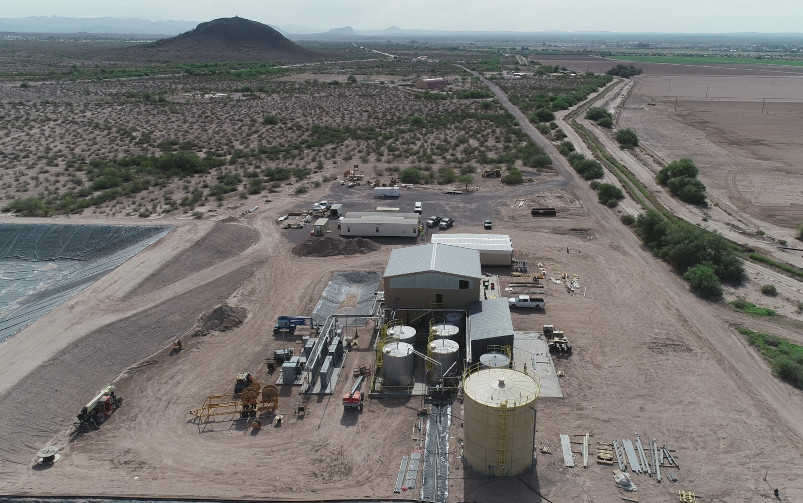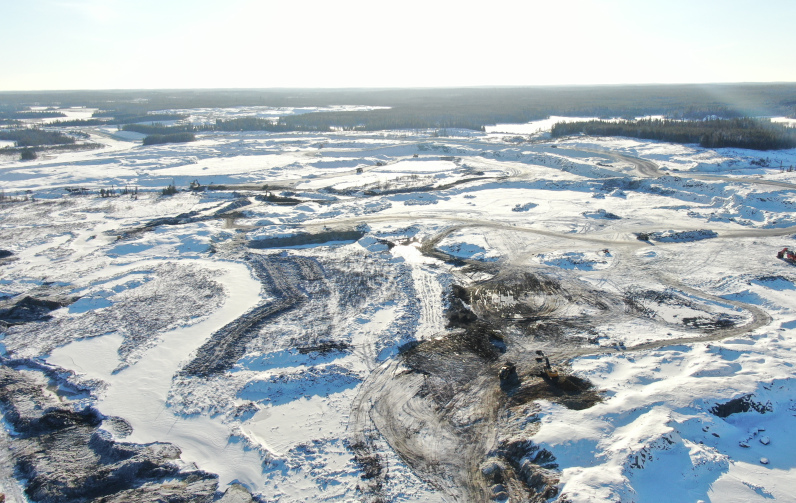Eldorado Gold's board of directors has approved a full restart for construction at its Skouries project in Greece. Courtesy of Eldorado Gold.
Welcome back to your weekly mining news recap, where we catch you up on some of the news you may have missed. This week’s headlines include a challenge to British Columbia’s mineral claim regime, approval from Eldorado to restart Skouries and Las Bambas running out of storage space for its copper concentrate.
Altiplano Minerals is taking a different approach with its Chilean Farellon iron-copper-gold mine to maximize value while sticking to tight limits on production. Building its own milling operation will allow Altiplano to recover more metals and market them as opposed to selling its concentrate to the state-controlled mineral processor, and staying within Chile’s small-mining permit regime allows Farellon to access government support that would be unavailable otherwise.
Rio Tinto has completed its US$3.3 billion takeover of Turquoise Hill, giving the company a 66 per cent stake in the Mongolian Oyu Tolgoi copper-gold mine, as reported by Reuters. Some minority shareholders opposed the deal, with Pentwater Capital Management – a 10-per cent shareholder in Turquoise Hill – possibly pursuing a class action lawsuit against Rio Tinto for allegedly concealing delays and cost increases. Rio Tinto says that the new, simpler ownership structure will help move production forward at the mine.
A court case surrounding British Columbia’s mineral claims process could result in significant changes to how mineral exploration is conducted in the province, as reported by Business in Vancouver. The case, which has First Nations, environmental groups and mining and exploration associations seeking intervenor status, will determine whether mineral claims must first obtain free, prior and informed consent as enshrined in the United Nations Declaration on the Rights of Indigenous People, which was enacted in 2019. The case is set to be heard in April 2023.
Barrick Gold has received final permission from the Supreme Court of Pakistan to proceed with its Reko Diq copper-gold project. According to Barrick, Reko Diq is one of the largest undeveloped copper projects in the world and is expected to produce approximately 430 million pounds of copper and 280,000 ounces of gold in the first five years of a 40-year mine life. Barrick is currently updating the project’s 2010 feasibility and 2011 feasibility expansion studies, which are expected for 2024, with first production targeted for 2028.
The government of Panama has ordered the stoppage of production at First Quantum Minerals' Cobre Panama mine after the two parties failed to agree on an economic package for government payments, as reported by Reuters. A deal had previously been reached in January for First Quantum to pay US$375 million in benefits per year, but was not finalized due to “necessary legal protections on termination stability and transition arrangements could not be agreed upon,” according to First Quantum. The company says it will look to defend the mine and its stakeholders from the government by any means, including taking legal action.
Eldorado Gold’s subsidiary, Hellas Gold Single Member S.A., has secured €680 million in financing towards the development of the Skouries project in Greece. Eldorado’s board of directors has also approved a full restart of construction at the project as well, which is currently approximately half-built. The project had been through legal limbo, going into care and maintenance in 2017, after not receiving its electromechanical installation permit, which would only be granted two years later. First production for the project is expected for the second half of 2025.
Rhyolite Resources will halt the development of the Muckahi Mining System after failing to find projects willing to adopt the system. The system was developed by Rhyolite’s CEO Fred Stanford, then-CEO of Torex Gold, and uses a ceiling-mounted two-lane monorail system to transport ore from underground mines. Muckahi was tested at Torex’s Media Luna project in Mexico, but in April 2021, the company announced it would pursue a conventional mining method, saying that there was “insufficient available upside” to continue pursuing the technology.
Canada, alongside other G7 countries, announced a new sustainable mining alliance at the COP15 biodiversity talks in Montreal, as reported by The Canadian Press. The alliance is an attempt to spread Canada’s recently announced Critical Minerals Strategy globally, and will affect how Canada sources its critical minerals, but details are scarce as to the actual changes that this new alliance will have on Canadian miners operating internationally.
Storage space for copper concentrate is running out at the Las Bambas mine in Peru, says its operator MMG Ltd., which could potentially slow or halt production, as reported by Bloomberg. The mine is currently unable to transport approximately 500,000 metric tonnes of concentrate, equivalent to US$1 billion, due to ongoing blockades of roads to the mine. According to MMG, the mine will continue production until the end of year but could have to halt production should it reach max storage capacity.
Piedmont Lithium and Sayona Mining have received the final permit required to restart operations at their North American Lithium joint-venture in Quebec. Production is expected to begin in the first half of next year, with shipments of spodumene concentrate from the operation beginning as early as Q3. A May 2022 pre-feasibility study for the operation estimates a 27-year mine life and reserves of 280,300 tonnes of lithium oxide from 29.2 million tonnes grading at 0.96 per cent.
That’s all for this week. If you’ve got feedback, you can always reach us at editor@cim.org. If you’ve got something to add, why not join the conversation on our Facebook, Twitter, LinkedIn or Instagram pages?




